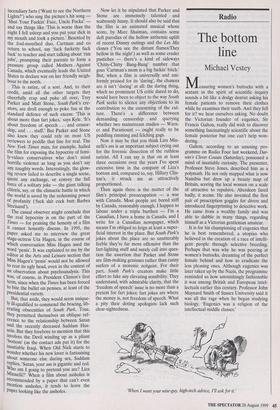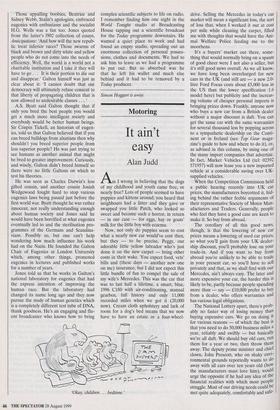Radio
The bottom line
Michael Vestey
Measuring women's buttocks with a sextant in the spirit of scientific inquiry sounds a bit like a dodgy dentist asking his female patients to remove their clothes while he examines their teeth. And they fell for it? we hear ourselves asking. No doubt the Victorian founder of eugenics, Sir Francis Galton, really did wish to discover something fascinatingly scientific about the female posterior but one can't help won- dering.
Galton, according to an amusing pro- gramme on Radio Four last weekend, Dar- win's Clever Cousin (Saturday), possessed a mind of insatiable curiosity. The presenter, Professor Steve Jones, described him as a polymath. He not only mapped what is now Namibia but drew up a beauty map of Britain, scoring the local women on a scale of attractive to repulsive. Aberdeen fared badly, it seems. He also invented the first pair of prescription goggles for divers and introduced fingerprinting to detective work. He came from a wealthy family and was able to dabble in many things, regarding himself as a Victorian gentleman amateur.
It is for his championing of eugenics that he is best remembered, a utopian who believed in the creation of a race of intelli- gent people through selective breeding. Perhaps that was why he was peering at women's buttocks, dreaming of the perfect female behind and how to eradicate the less pleasing ones. Although eugenics was later taken up by the Nazis, the programme reminded us how astonishingly fashionable it was among British and European intel- lectuals earlier this century. Professor John Maynard Smith of Sussex University said it was all the rage when he began studying biology, 'Eugenics was a religion of the intellectual middle classes.'
`When I want your wise-guy, high-tech advice, I'll ask for it.' Those appalling boobies, Beatrice and Sidney Webb, Stalin's apologists, embraced eugenics with enthusiasm and the socialist H.G. Wells was a fan too. Jones quoted from the latter's 1902 collection of essays, Anticipations: 'And how will the new repub- lic treat inferior races? Those swarms of black and brown and dirty white and yellow people who do not come into the needs of efficiency. Well, the world is a world not a charitable institution and I take it they will have to go . . . It is their portion to die out and disappear.' Galton himself was just as clear about it: 'I cannot doubt that our democracy will ultimately refuse consent to that liberty of propagating children that is now allowed to undesirable classes . . . '
A.S. Byatt said Galton thought that if only you bred the best people you would get a much more intelligent society and everybody would be better human beings. Sir Crispin Tickell, an historian of eugen- ics, told us that Galton believed that if you can breed bulldogs from alsatians then why shouldn't you breed superior people from less superior people? He was just trying to see humans as another animal that might be bred to greater improvement. Curiously, and wisely, Galton didn't breed himself so there were no little Galtons on which to test his theories.
He was seen as Charles Darwin's less gifted cousin, and another cousin Josiah Wedgewood fought hard to stop various eugenics laws being passed just before the first world war. Byatt thought he was rather innocent, not really understanding enough about human society and Jones said he would have been horrified at what eugenics eventually led to and the sterilisation pro- grammes of the Germans and Scandina- vians. Possibly so, but one can't help wondering how much influence his work had on the Nazis. He founded the Galion Chair of Eugenics at London University which, among other things, promoted eugenics in lectures and published works for a number of years.
Jones told us that he works in Galton's national laboratory for eugenics that had the express intention of improving the human race. But the laboratory had changed its name long ago and they now pursue the study of human genetics which is a completely different test tube of DNA, thank goodness. He's an engaging and flu- ent broadcaster who knows how to bring complex scientific subjects to life on radio. I remember finding him one night in the World Tonight studio at Broadcasting House tapping out a scientific broadcast for the Today programme downstairs. He wanted a quiet place to work and had found an empty studio, spreading out an enormous collection of personal posses- sions, clothes and documents. We had to ask him to leave as we had a programme to put out. But so absorbed was he that he left his wallet and much else behind and it had to be removed by a Today producer.



























































 Previous page
Previous page